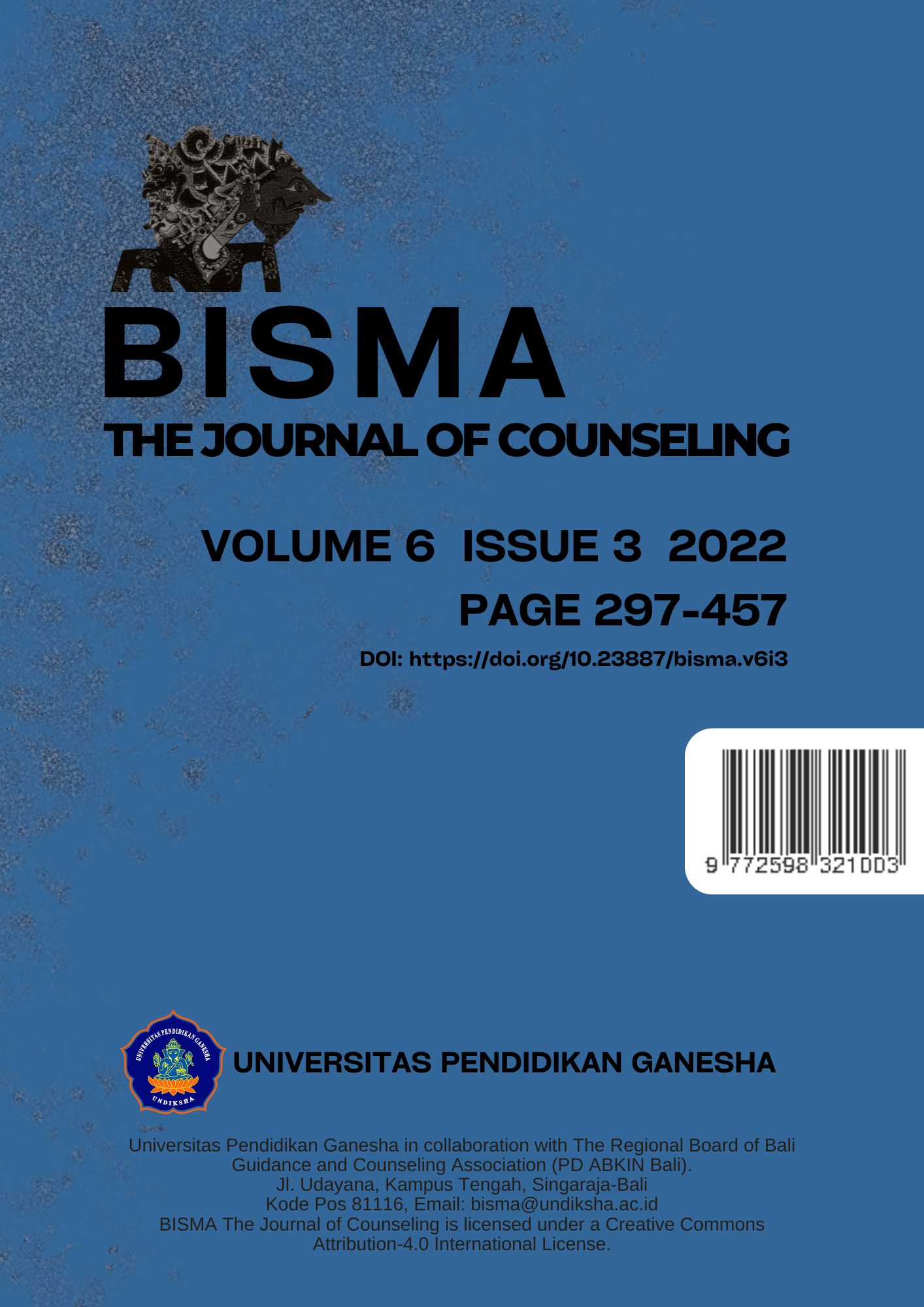Effectiveness of Training for Peer Counselors to Improve Gender Awareness
DOI:
https://doi.org/10.23887/bisma.v6i3.53419Keywords:
peer counselor, gender awarness, trainingAbstract
The study aimed to discover the effectiveness of training for trainers of peer counselors to improve gender awareness at two Islamic Universities in Banjarmasin City. The study employed a qualitative approach with the true experimental design in the form of a Pre-test Post-test Control Group Design. The study object was gender awareness. Data were collected using the gender awareness scale. The study was conducted in Banjarmasin on students of the Counseling Department of UIN Antasari Banjarmasin and Islamic University of Kalimantan Muhammad Arsyad Al Banjary. The data were analyzed using a T-test. The study discovered that training for trainers of peer counselors is effective to improve gender awareness observed from the significant test difference between the experiment and control groups.
References
Achdami, M. (2021). January - July 2021 experienced 2500 Cases, Nadiem: Kekerasan Seksual di Perguruan Tinggi Meningkat. Pikiran-Rakyat.com https://jakartautara.pikiran-rakyat.com/nasional/pr-1763207132/januari-juli-2021-terjadi-2500-kasus-nadiem-kekerasan-seksual-di-perguruan-tinggi-meningkat.
Afif, Nur. Asep Ubaidillah, & Muhammad Sulhan. 2020. Konsep Kesetaraan Gender Perspektif Fatima Mernissi dan Implikasinya dalam Pendidikan Islam. Ilmu Al-Qur’an (IQ) Jurnal Pendidikan Islam Volume 3 No.02 (2020), 229-242. DOI: 10.37542/iq.v3i02.131.
Antasari, R. R et. all., (2022) Gender Mainstreaming Problems in Student Organizations at Islamic Religious Colleges. Al Ishlah. Jurnal Pendidikan LP2M STAI Hubul Wathan, Duri, Bengkalis, Riau . Vol 14. no. 2. DOI: https://doi.org/10.35445/alishlah.v14i2.1402
Aruan, C. D. (2019). Sumber Daya Manusia dan Produktivitas. Jakarta.
Astiti, Shofi Puji. 2019. Efektivitas Konseling Sebaya (Peer Counseling) dalam Menuntaskan Masalah Siswa. Indonesian Journal of Islamic Psychology. Volume 1. Number 2, December 2019. p-ISSN 2685-1482, e-ISSN 2714-7576. http://e-journal.iainsalatiga.ac.id/index.php/ijip/index
Bahagijo, Y. E. Prasetyo, D. Kawuryan, B. Tua, and A. D. Eridani. (2022). losing The Digital Gender Gap In Indonesia Through The Roles And Initiatives Of Civil Society Organizations. Jurnal Ilmu Sosial, vol. 21, no. 1, pp. 14-38, Jan. 2022. https://doi.org/10.14710/jis.21.1.2022.14-38
Butler, N., Quigg, Z., Bates, R. et al. The Contributing Role of Family, School, and Peer Supportive Relationships in Protecting the Mental Wellbeing of Children and Adolescents. School Mental Health 14, 776–788 (2022). https://doi.org/10.1007/s12310-022-09502-9
Charismi, Arum Aprillia, Mochmmad Djudi, & Ika Ruhana. (2016) Analisis Efektivitas Pelatihan (Studi Pada Unit Pengembangan Karir Dan Kewirausahaan Universitas Brawijaya Malang). Jurnal Administrasi Bisnis (JAB)|Vol. 38 No.2 September 2016. https://media.neliti.com/media/publications/87365-ID
Cowie, H., dan Wallace, P. (2000). Peer Support in Action: From Bystanding to Standing By. London : Sage Publications
Dhewy, A. (2014, June 6). Lies Marcoes-Natsir: Perlu Melibatkan Perempuan dalam Upaya Deradikalisasi. jurnalperempuan.org. Retrieved August 16, 2022, from https://www.jurnalperempuan.org/lies-marcoes-natsir-perlu-melibatkan-perempuan-dalam-upaya-deradikalisasi.html
Faristiana, A. R. (2020) Manifestation of Gender Inequalities in Student Organizations. http://repository.iainponorogo.ac.id/718/1/2489-7873-1-SM.pdf
Fahyuni, E. F. (2021). Buku Ajar Inovasi Konselor Sebaya di Sekolah (Dalam Perspektif Pendidikan Islam) . Umsida Press
Fayuni, Badriyah, et al. (2001). Keadilan dan Kesetaraan Gender Perspektif Islam, (Jakarta : Tim Pemberdayaan Perempuan Bidang agama Depag RI), Cet. I
Fitri, A., Haekal, M., Al Mukarramah, A., & Sari, F. M. (2021). Sexual violence in Indonesian University: On students’ critical consciousness and agency. Gender Equality: International Journal of Child and Gender Studies, 7(2), 153. https://doi.org/10.22373/equality.v7i2.9869
Handayani, M. S., & Marcoes, L. (2019, April 10). Kampus Tak Punya Perspektif Adil Gender, Saatnya Perempuan Memimpin. Tirto.Id. Retrieved August 16, 2022, from https://amp.tirto.id/kampus-tak-punya-perspektif-adil-gender-saatnya-perempuan-memimpin-dkSJ.
Indriyany, I. A., Hikmawan, M. D., & Utami, W. K. (2021). Gender dan Pendidikan Tinggi: Studi tentang Urgensitas Kampus Berperspektif Gender. JIIP: Jurnal Ilmiah Ilmu Pemerintahan, 6 (1), 55-72. https://doi.org/10.14710/jiip.v6i1.9376
Komnas Perempuan. (2021). CATAHU 2021: Perempuan Dalam Himpitan Pandemi: Lonjakan Kekerasan Seksual, Kekerasan Siber, Perkawinan Anak Dan Keterbatasan Penanganan Di Tengah Covid-19. Komnas Perempuan. https://komnasperempuan.go.id/catatan-tahunan-detail/catahu-2021-perempuan-dalam-himpitan-pandemi-lonjakan-kekerasan-seksual-kekerasan-siber-perkawinan-anak-dan-keterbatasan-penanganan-di-tengah-covid-19
Kusmanto, T. (2017). Dinamika Pengarusutamaan Gender Pada Pendidikan Tinggi Islam. Sawwa: Jurnal Studi Gender, 12(3), 303-320. doi:https://doi.org/10.21580/sa.v12i3.2091
Luviana. (2021). Merayakan Feminisme: Meluruskan Pandangan yang Salah tentang Feminisme. Konde.co. https://www.konde.co/2021/08/merayakan-feminisme-meluruskan-pandangan-salah-tentang-feminisme.html/
Manurung,Monica Mayeni & Rahmad. (2017). Identifikasi Faktor-faktor Pembentukan Karakter Mahasiswa. JAS-PT Jurnal Analisis Sistem Pendidikan Tinggi. Vol. 1 No. 1 2017, Pp. 41-46.
Noe, Raymond A. (2005). Employee Training and Development. Third Edition. McGraw Hill: New York
Oláh, L.S., Kotowska, I.E., Richter, R. (2018). The New Roles of Men and Women and Implications for Families and Societies. In: Doblhammer, G., Gumà, J. (eds) A Demographic Perspective on Gender, Family and Health in Europe. Springer, Cham. https://doi.org/10.1007/978-3-319-72356-3_4
Raditha, Rara. (2019) Lima Kesalahpahaman tentang Feminisme yang Sering Terjadi di Masyarakat. https://journal.sociolla.com/lifestyle/kesalahpahaman-tentang-feminisme.
Rahmah, Syarifah. (2019). Pendidikan Dan Kesetaraan Gender Dalam Islam Di Aceh. Gender Equality: International Journal of Child and Gender Studies. Vol. 5, No. 1, Maret 2019,h. 25-42. https://jurnal.ar-raniry.ac.id/index.php/equality/article/view/5376
Siswoyo, Dwi. et al. (2007). Ilmu Pendidikan, Yogyakarta: UNY Press.
Suranata, K. (2013). Pengembangan Model Tutor Bimbingan Konseling Sebaya (Peer Counseling) untuk Mengatasi Masalah Mahasiswa Fakultas Ilmu Pendidikan Undiksha. Jurnal Pendidikan Indonesia, 2, (2), 255-263. https://ejournal.undiksha.ac.id/index.php/JPI/article/view/21 70
Sutoyo, A. (2003) Bimbingan & Konseling Islami (Teori dan Praktik), (Yogyakarta: Pustaka Pelajar, 2003), Cetakan ke 1
Taufiq , Ahmad. (2007) Islam dan Gerakan Kesetaraan Gender Di Indonesia. Universum, 01 (01). Pp. 53-62. http://Repository.Iainkediri.Ac.Id/250/
Umar, Nasaruddin. (2001). Argumen Kesetaraan Jender Perspertif al-Quran (Jakarta: Paramadina).
UNESCO-IESALC. (2022). Global universities address gender equality but gaps remain to be closed. https://www.iesalc.unesco.org/en/2022/03/08/global-universities-address-gender-equality-but-gaps-remain-to-be-closed/ .
Qomariah, Dede Nurul. (2019). Persepsi Masyarakat Mengenai Kesetaraan Gender Dalam Keluarga. Jurnal Cendekiawan Ilmiah PLS Vol 4 No 2 Desember 2019
Warliah, Wiwin. Pendidikan Berbasis Gender Awareness; Strategi Meminimalisir Bias Gender Di Pondok Pesantren. Jurnal Islam Nusantara. Volume. 01 Nomor. 02 Juli-Desember 2017 https://jurnalnu.com/index.php/as/article/view/30/21
Downloads
Published
Issue
Section
License
Copyright (c) 2022 mufida istati, Helma Nuraini

This work is licensed under a Creative Commons Attribution 4.0 International License.









